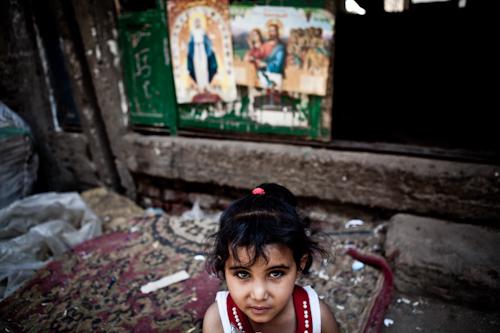 Two weeks after the election of President Mohamed Morsy, the Coptic community is concerned about the implementation of Islamic law. On Saturday, 7 July, Copts protested outside the presidential palace to call on Morsy to protect his citizens, reinstate security and preserve the rights and freedoms of all Egyptians.
Two weeks after the election of President Mohamed Morsy, the Coptic community is concerned about the implementation of Islamic law. On Saturday, 7 July, Copts protested outside the presidential palace to call on Morsy to protect his citizens, reinstate security and preserve the rights and freedoms of all Egyptians.
In “Garbage City,” a residential and trash-collecting area in Manshiyet Nasser where Coptic Christians are the predominant inhabitants, many believe that the new president is not only a threat for the Coptic community, but for Egypt as a whole.
“We are worried that the Muslim Brotherhood will impose Sharia in Egypt. If so, we'll be back in the Middle Ages — we will see only covered women with almost no rights, like in Saudi Arabia, for example. We won’t have any freedom of speech. This will be a problem for Copts and for Muslims. What we need is a civilized country, and I’m scared that the Muslim Brotherhood and Mohamed Morsy won’t bring that to us,” said Sameh Nassar, a 24-year-old English student at Cairo University.
After the first round of the presidential elections, the Coptic community was blamed for voting for Ahmed Shafiq and boosting him into the runoffs.
“People in the community were disappointed by Morsy’s victory,” explains Nassar, “but it wasn’t because we wanted Shafiq to be president, but rather because we didn’t want Morsy and the Muslim Brotherhood to rule the country.”
For Simone Wagheh, a 20-year-old student at the faculty of economics and political science, the presidential elections results weren’t a surprise. She invalidated her vote because she didn’t want the president to have been part of a corrupt regime or have Islamic biases. She wanted a revolutionary president, and felt that Hamdeen Sabbahi would be one.
But Wagheh is not afraid of the future. “I have confidence in the Egyptian people's mentality. They didn't make the revolution for someone to go and oblige girls to wear the veil. We are not in Iran," she stated.
In the streets of Manshiyet Nasser, posters of the late Pope Shenouda still hang on the high and narrow buildings among the few tattered and fading election posters.
Most of the Coptic men living in the area work in the recycling industry and are collectively known as the “Zabaleen.” During Mubarak's rule, their economic situation worsened as private companies were invited to establish recycling operations in the country.
For Ezzat Naem Gendy, the chairman of the garbage collectors syndicate in the district, “Morsy doesn’t know anything about our situation. He will rely on his municipal governors and the multinational companies, but he won’t get involved in the issue directly.”
But lately, Morsy suggested that Friday prayer sermons should encourage people to not litter. He also suggested the creation of a committee to help NGOs working with garbage collectors.
Naem Gendy says the whole country should be recycled. He didn’t want Morsy or Shafiq to win, but now he is focusing on the redrafting of the constitution.
“It’s the main core. We should look at the example of European countries, which are civil societies. If we have Sharia, then we will be in danger. The constitution is a matter of state; Sharia and the Bible must stay in mosques and churches. If they impose Sharia on us, it will be dangerous for the country and for the Coptic community, who will be considered a second-class people,” Gendy said.
In the main road of "Garbage City," men are gathering for a tea on Sunday evening. Talking about politics, opinions are divided. Maydiwany Tawfik, a 35-year-old pharmacist, wants to give Morsy a chance to change the country for the better.
“Now, after the revolution, we should give him one year to change the country — he’s not a magician, after all. Now we should listen to another man, someone other than Mubarak. If the good change is not coming, we'll do another revolution,” he said.
His friend sitting next to him, Youssry Fikry, a 24-year-old garbage collector, replied that he doesn’t trust the Muslim Brotherhood and sees Morsy as its puppet. “They are taking over everything and want all the power. Many people believed in Mohamed Morsy although he was just a replacement for Khairat al-Shater. The Brotherhood used religion to get the votes of the illiterate people. I’m afraid that he won’t do a thing for us or our businesses.”
Maged Mourad expresses a concern common among Coptic citizens. “I voted for Shafiq because I just want the safety which I had during Mubarak’s time. All what we want now is to feel safe.”
Nawal Bekheit Awad, a 52-year-old housewife, simply hopes that Morsy will not oppress any Muslim or Christian. Like Fikry, she doesn't want the Brotherhood standing behind him to govern the country.
“We need to live in peace and to feel free, and I don't want a group of Salafis to come in their white robes asking for an Islamic country,” Awad said.



